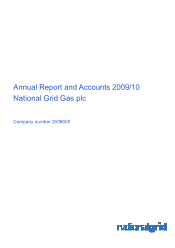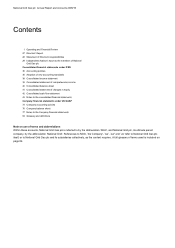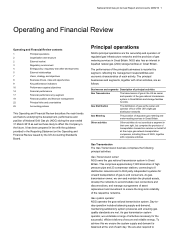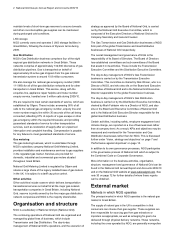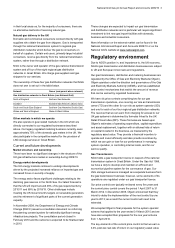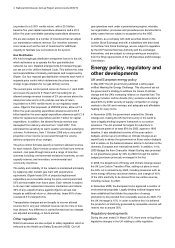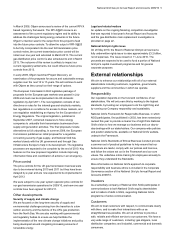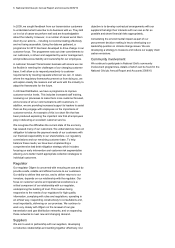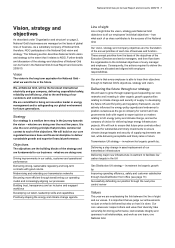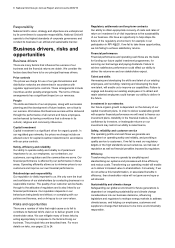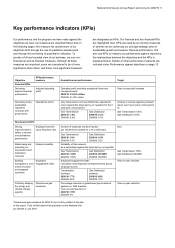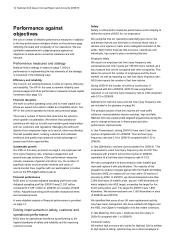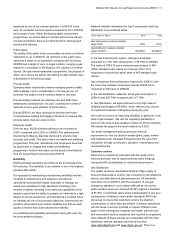National Grid 2010 Annual Report Download - page 5
Download and view the complete annual report
Please find page 5 of the 2010 National Grid annual report below. You can navigate through the pages in the report by either clicking on the pages listed below, or by using the keyword search tool below to find specific information within the annual report.
National Grid Gas plc Annual Report and Accounts 2009/10 3
in their local areas as, for the majority of consumers, there are
no alternative methods of receiving natural gas.
Natural gas delivery in the UK
Domestic and commercial consumers contract directly with gas
suppliers who obtain the gas from shippers. Gas is transported
through the national transmission system to regional gas
distribution networks which deliver the gas to consumers on
behalf of suppliers. Certain end users, primarily large industrial
consumers, receive gas directly from the national transmission
system, rather than through a distribution network.
NGG is the owner and operator of the gas national transmission
system and of four of the eight regional gas distribution
networks in Great Britain. We charge gas suppliers and gas
shippers for our services.
The ownership of these four gas distribution networks that NGG
does not own is set out in the table below.
Network Owner (and parent where relevant)
Gas distribution networks in Great Britain (non National Grid)
North of England Northern Gas Networks
Scotland Scotland Gas Networks (Scotia Gas)
South and South East England Southern Gas Networks (Scotia Gas)
Wales and West of England Wales & West Utilities
Other markets in which we operate
We also operate in gas related markets in the UK which are
directly connected to our regulated businesses described
above. Our legacy regulated metering business currently owns
approximately 75% of the domestic gas meters in the UK. We
also participate in the competitive market for the provision of
LNG storage services in Great Britain.
Current and future developments
Market structure and ownership
There have been no significant changes in the structure of the
UK gas infrastructure market or ownership during 2009/10.
Energy market developments
The UK energy markets continue to undergo developments
driven by the projected increased reliance on imported gas and
increased focus on security of supply.
The energy sector faces significant challenges relating to the
declining gas reserves in the North Sea. Our latest forecast is
that the UK will import around 46% of its gas requirements by
2010/11 and 69% by 2018/19. Other challenges include
meeting the UK Government’s targets on renewable generation,
and the retirement of significant parts of the current generation
capacity.
In November 2009, the Department of Energy and Climate
Change (DECC) issued a consultation document on reforming
the planning consent system for nationally significant energy
infrastructure projects. The consultation period closed in
February 2010 and the outcome is expected to be finalised later
in 2010.
These changes are expected to impact our gas transmission
and distribution networks and in particular will require significant
investment to link new gas import facilities with domestic,
business and industrial consumers.
More information on the external market can be found in the
National Grid Annual Report and Accounts 2009/10 or on the
National Grid’s website at www.nationalgrid.com.
Regulatory environment
Due to NGG’s position in, and importance to, the UK economy,
NGG’s gas transmission and distribution businesses are subject
to UK and European Union laws and regulations.
Our gas transmission, distribution and metering businesses are
regulated by the Office of Gas and Electricity Markets (Ofgem).
Ofgem operates under the direction and governance of the Gas
and Electricity Markets Authority (GEMA), and has established
price control mechanisms that restrict the amount of revenue
that can be earned by regulated businesses.
We have six price controls comprising two for our gas
transmission operations, one covering our role as transmission
owner (TO) and the other for our role as system operator (SO);
and one for each of our four regional gas distribution networks.
The revenue that we can earn from charging for access to our
UK gas systems is determined by formulas linked to the UK
Retail Prices Index (RPI). These formulas are based upon
Ofgem’s estimates of operating expenditure, capital expenditure
and asset replacement, together with an allowed rate of return
on capital invested in the business, as measured by the
regulatory asset value. They provide a financial incentive to
operate and invest efficiently and also provide incentives by
which we can gain or lose for our performance in managing
system operation, in controlling internal costs, and for our
service quality.
Gas Transmission
NGG holds a gas transporter licence in respect of the national
transmission system in Great Britain. Under the Gas Act 1986,
we have a duty to develop and maintain an efficient and
economical pipeline system for the conveyance of gas. Our
LNG storage business is managed as a separate business from
the gas transmission business; however, some elements of its
operations are regulated under our gas transporter licence.
Our price controls are typically reviewed every five years and
the current price control covers the period 1 April 2007 to 31
March 2012. In December 2009, Ofgem announced that they
intend to delay the implementation of the next control by one
year to 2013; as a result the current control will need to be
extended.
We accepted Ofgem’s final proposals for the system operator
scheme that applied to the year ended 31 March 2010 and we
have also accepted their proposals for the one year scheme
from 1 April 2010.
The key elements of the current price control is that we earn a
4.4% post-tax real rate of return on our regulatory asset value

